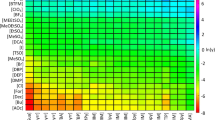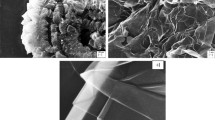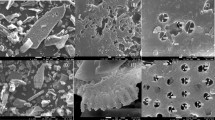Abstract
THE conditions under which some antibiotics are hydrolysed may be important for the isolation and identification of the products of their decomposition since these are used in investigations of the structure of the antibiotics. During hydrolysis with mineral acids some moieties, such as carbohydrates, may be destroyed, and much humin may be produced which makes it difficult to isolate the more stable products of decomposition in pure form.
This is a preview of subscription content, access via your institution
Access options
Subscribe to this journal
Receive 51 print issues and online access
$199.00 per year
only $3.90 per issue
Buy this article
- Purchase on Springer Link
- Instant access to full article PDF
Prices may be subject to local taxes which are calculated during checkout
Similar content being viewed by others
References
Brazhnikova, M., Kudinova, M., Lavrova, M., and Uspenskaia, T., Antibiotiki, 4, 6 (1960).
Lomakina, N., Urina, M., Lavrova, M., and Brazhnikova, M., Antibiotiki, 7, 609 (1961).
Brazhnikova, M., Kudinova, M., and Trofileeva, R., Biokhimia, 26, 448 (1961).
Author information
Authors and Affiliations
Rights and permissions
About this article
Cite this article
BRAZHNIKOVA, M., KUDINOVA, M. Hydrolysis of Some Antibiotics and of their Decomposition Products in the Presence of Cation Exchange Resins. Nature 200, 167–168 (1963). https://doi.org/10.1038/200167b0
Issue Date:
DOI: https://doi.org/10.1038/200167b0
Comments
By submitting a comment you agree to abide by our Terms and Community Guidelines. If you find something abusive or that does not comply with our terms or guidelines please flag it as inappropriate.



